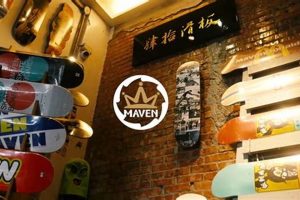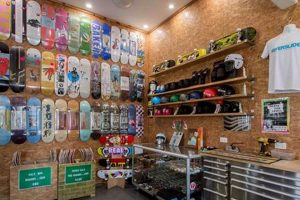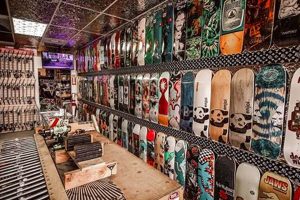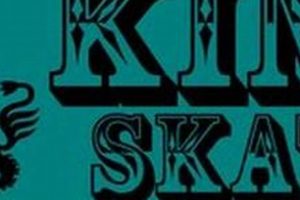Establishments specializing in the sale of skateboarding equipment, apparel, and related accessories located within the Albuquerque metropolitan area are the focus. These businesses cater to skateboarders of all skill levels, from beginners to experienced riders, providing necessary gear and often offering expert advice.
The existence of such retail locations supports the local skateboarding community by providing access to quality equipment and a gathering point for enthusiasts. They contribute to the local economy and foster the growth of skateboarding as a recreational activity and sport within the city. Historically, these establishments have evolved alongside the skateboarding culture, adapting to changing trends and technological advancements in skateboarding equipment.
The following sections will delve into specific examples of these establishments, examining the products and services they offer, their impact on the Albuquerque skateboarding scene, and considerations for selecting the appropriate location for individual needs.
Guidance from Albuquerque Skateboarding Retailers
The following provides practical advice sourced from establishments in Albuquerque that specialize in skateboarding. This information is designed to assist both novice and experienced skateboarders in making informed decisions regarding equipment and technique.
Tip 1: Deck Selection: When choosing a skateboard deck, consider the intended riding style. Street skateboarding typically benefits from a narrower deck (7.75″ to 8.25″), while transition and park riding often call for a wider deck (8.25″ or wider) for increased stability.
Tip 2: Truck Considerations: Truck size should correlate with deck width. Ensuring proper alignment between the trucks and deck prevents instability and potential hardware failure. Reputable establishments can assist with matching the appropriate truck size to the chosen deck.
Tip 3: Wheel Hardness: Wheel durometer (hardness) significantly impacts performance. Softer wheels (78a-87a) provide greater grip and are suitable for rougher surfaces, while harder wheels (97a-101a) are faster and ideal for smooth surfaces like skateparks.
Tip 4: Bearing Maintenance: Regular cleaning and lubrication of skateboard bearings are crucial for maintaining optimal speed and performance. Grit and debris accumulation can significantly impede bearing function. Specialized bearing cleaning kits are available.
Tip 5: Footwear Selection: Skateboarding footwear should offer durability, board feel, and ankle support. Flat-soled shoes with reinforced stitching and abrasion-resistant materials are recommended. Many skateboarding-specific shoes are available, designed to withstand the rigors of the sport.
Tip 6: Protective Gear: Prioritize safety by wearing appropriate protective gear, including a helmet, knee pads, elbow pads, and wrist guards. These items can significantly reduce the risk of injury, particularly for beginners.
Tip 7: Local Skatepark Etiquette: Familiarize oneself with the rules and etiquette of local skateparks. Respect other skaters, take turns, and avoid obstructing pathways or ramps. Adhering to these guidelines promotes a positive and safe environment for all.
Adhering to these guidelines, derived from the expertise of Albuquerque’s skateboarding retailers, can enhance the skateboarding experience and contribute to safer participation in the sport.
The subsequent discussion will address specific locations and their specialized offerings.
1. Equipment Variety
Equipment variety within Albuquerque’s skateboarding retail sector is a critical factor influencing consumer choice and the overall health of the local skateboarding scene. The availability of diverse products directly impacts the ability of skateboarders to customize their equipment, adapt to different terrains, and progress in their skills.
- Deck Specialization
The breadth of deck selection extends beyond size and brand. Shops must offer decks constructed from various materials (e.g., Canadian maple, composites), concaves (e.g., mellow, steep), and shapes (e.g., popsicle, directional). This allows riders to tailor their board to specific riding styles, such as street, park, or vert skating. Limited deck options restrict adaptability and hinder personalized performance.
- Truck Customization
Trucks vary in height, width, and turning responsiveness. Retailers should provide a range of truck brands and models, enabling customers to select trucks that complement their deck and riding preferences. The availability of different bushing durometers further refines turning sensitivity. Insufficient truck options limit control and responsiveness, impacting rider confidence.
- Wheel Diversity
Wheel selection requires consideration of diameter, durometer, and contact patch. Smaller, harder wheels are typically favored for street skating, while larger, softer wheels excel on rougher surfaces. Offering a spectrum of wheel types allows riders to optimize their speed, grip, and shock absorption. Limited wheel diversity restricts terrain versatility and ride comfort.
- Hardware and Accessory Availability
Beyond major components, access to specialized hardware (e.g., riser pads, bearing spacers, kingpin options) and accessories (e.g., grip tape designs, rail guards, skate tools) is essential. These items allow for fine-tuning equipment performance and protecting components from wear and tear. Insufficient hardware and accessory options compromise customization and long-term equipment maintenance.
The scope of equipment variety directly reflects the responsiveness of Albuquerque’s skate shops to the diverse needs of the skateboarding community. Retailers that prioritize a wide selection empower skateboarders to optimize their equipment for performance, comfort, and personal expression. This, in turn, fosters a more engaged and thriving skateboarding culture within the city.
2. Community Support
The function of Albuquerque’s establishments specializing in skateboarding extends beyond mere retail; they serve as vital hubs for community support. These businesses often facilitate skateboarding culture through sponsorships, events, and fostering a sense of belonging among local skateboarders. This active engagement solidifies their role as integral components of the skateboarding ecosystem within the city. For instance, a local shop might sponsor a “Go Skateboarding Day” event, organizing competitions and providing resources that promote skateboarding participation. This contributes directly to the growth and visibility of the sport within Albuquerque.
Furthermore, these establishments frequently support emerging talent. Providing discounted equipment or mentorship opportunities to promising young skateboarders allows them to develop their skills and pursue their passion. Some shops also collaborate with local artists to create custom skateboard designs, blending skateboarding with other creative expressions. The practical significance of this support lies in its ability to nurture a thriving skateboarding community, fostering creativity, skill development, and a shared identity among participants. Without this dedicated support network, the skateboarding scene in Albuquerque would likely face limitations in growth and accessibility.
In conclusion, the connection between skateboarding retailers in Albuquerque and community support is bidirectional and essential. These businesses benefit from the loyalty and patronage of the local skateboarding community, while simultaneously contributing to its growth and well-being through various support initiatives. Addressing the challenges faced by these establishments, such as economic fluctuations or increased competition from online retailers, is crucial to ensuring the continued availability of this vital community support network. The symbiotic relationship underscores the importance of these entities to the vibrancy and sustainability of skateboarding culture in Albuquerque.
3. Expert assistance
The availability of knowledgeable staff constitutes a critical component of skateboard retail establishments in Albuquerque. This “expert assistance” directly influences customer satisfaction, equipment selection accuracy, and, ultimately, the safety and progression of skateboarders. The connection between specialized knowledge and customer outcome is a key differentiator for physical retailers in an increasingly digital marketplace. For example, a novice skateboarder entering a shop requires guidance on deck size, truck compatibility, and appropriate wheel durometer. Staff with experience can assess the individual’s skill level, intended riding style, and physical attributes to recommend suitable equipment combinations, thereby preventing the purchase of ill-suited or potentially dangerous gear. Furthermore, expert assistance extends beyond initial purchase, encompassing advice on equipment maintenance, repair techniques, and identifying potential performance issues.
The practical application of expert assistance is demonstrated through scenarios such as diagnosing wheel bearing problems, adjusting truck tightness for optimal turning, or identifying the root cause of deck cracking. Shops providing this level of service often develop a loyal customer base, as skateboarders value the ability to receive reliable and informed advice from experienced individuals. A well-informed shop employee can guide a customer through the intricacies of selecting the correct type of bearing lubricant or demonstrate proper grip tape application techniques, thereby enhancing the longevity and performance of the equipment. Local skate shops also often play a role in imparting knowledge related to skateboarding safety, local skatepark etiquette, and updates on new products or technologies. This dissemination of knowledge fosters a safer and more informed skateboarding community.
However, the quality of expert assistance can vary significantly between establishments. The challenge for Albuquerque’s skate shops lies in recruiting and retaining staff with sufficient skateboarding experience and product knowledge, while also ensuring that employees possess effective communication and customer service skills. Addressing this challenge requires ongoing training programs, incentives for expertise development, and a commitment to fostering a positive and knowledgeable work environment. Ultimately, the degree to which Albuquerque’s skate shops prioritize and deliver expert assistance directly impacts their value proposition and their contribution to the local skateboarding ecosystem.
4. Location Accessibility
The geographic placement of Albuquerque’s skateboarding retail establishments directly impacts their accessibility to the target demographic and, consequently, their overall business performance. Conveniently located shops, especially those situated near skate parks, schools, or high-traffic areas, tend to attract a larger customer base. The practical significance of this proximity lies in the spontaneous nature of skateboarding purchases; a skater experiencing equipment malfunction or seeking immediate upgrades is more likely to patronize a nearby shop than one requiring significant travel. For example, a shop located within walking distance of the popular Los Altos Skatepark enjoys a built-in advantage, serving both local residents and visiting skaters. The inverse also holds true; shops situated in geographically isolated or difficult-to-access areas may struggle to attract customers, even if they offer competitive pricing and superior service.
Beyond mere proximity, accessibility encompasses factors such as parking availability, public transportation access, and neighborhood safety. Limited parking options can deter potential customers, particularly those traveling from outside the immediate vicinity. Proximity to bus routes or other forms of public transit expands the potential customer base to individuals without personal vehicles. The perceived safety of the surrounding neighborhood also influences consumer behavior; customers may be reluctant to visit shops located in areas perceived as unsafe, regardless of the shop’s merits. Furthermore, visibility plays a crucial role. Shops located on prominent thoroughfares or with clear signage are more likely to attract passing traffic than those hidden on side streets or lacking adequate visibility. The integration of Albuquerque’s skate shops within the urban fabric thus represents a critical aspect of their operational success.
In conclusion, location accessibility represents a non-negligible factor determining the viability of skateboarding retailers in Albuquerque. The strategic placement of these shops, considering proximity to skateparks, transportation infrastructure, and neighborhood safety, is paramount to maximizing customer traffic and fostering a thriving skateboarding community. The challenges associated with overcoming geographical limitations underscore the importance of careful site selection and a comprehensive understanding of the local urban landscape for any aspiring skateboarding retailer in Albuquerque.
5. Price competitiveness
Price competitiveness significantly affects the sustainability and market share of skateboarding retail establishments within Albuquerque. Navigating the complexities of pricing strategies is crucial, given the presence of both brick-and-mortar shops and online vendors catering to the skateboarding community.
- Impact of Online Retailers
Online retailers, frequently operating with lower overhead costs, often offer products at prices that traditional brick-and-mortar shops struggle to match. This discrepancy forces Albuquerque’s shops to carefully consider their pricing strategies and identify alternative value propositions, such as expert assistance and community involvement, to justify potential price differences.
- Local Economic Factors
Albuquerque’s local economic conditions influence price sensitivity among consumers. Lower average incomes may necessitate that skateboarding equipment is priced competitively to remain accessible to a broader segment of the population. Shops must balance profit margins with affordability to maintain a sustainable customer base.
- Inventory Management Strategies
Effective inventory management is directly linked to price competitiveness. Overstocking can lead to the need for clearance sales and reduced profit margins, while understocking may drive customers to competitors. Albuquerque’s skate shops must employ strategies to optimize inventory levels and minimize the need for drastic price reductions.
- Supplier Relationships and Bulk Purchasing
Establishing strong relationships with suppliers and leveraging bulk purchasing power are strategies that can enhance price competitiveness. Negotiating favorable terms with suppliers allows shops to acquire inventory at lower costs, which can then be passed on to consumers. This requires effective supply chain management and negotiation skills.
The interplay between these factors dictates the ability of Albuquerque’s skateboarding retailers to compete effectively in the marketplace. A failure to address these challenges can result in reduced market share, decreased profitability, and, ultimately, the closure of local skateboarding establishments.
Frequently Asked Questions Regarding Albuquerque Skateboarding Retailers
The following addresses common inquiries pertaining to establishments specializing in skateboarding equipment within the Albuquerque metropolitan area. These answers aim to provide clarity and guidance to individuals seeking to engage with the local skateboarding scene.
Question 1: What factors should be considered when selecting a skateboard deck at Albuquerque retailers?
A skateboard deck’s width should align with the intended riding style. Street skateboarding typically utilizes narrower decks (7.75″ to 8.25″), whereas park or transition riding often benefits from wider decks (8.25″ or greater) for enhanced stability. Deck material and concave should also be considered.
Question 2: How do Albuquerque skate shops contribute to the local skateboarding community?
These establishments frequently sponsor local skateboarding events, support local skaters, and provide a physical space for skateboarders to gather and connect. They also offer expert advice and resources that foster skill development and community engagement.
Question 3: What is the significance of wheel durometer, and how does it relate to Albuquerque skateboarding conditions?
Wheel durometer, which refers to wheel hardness, significantly impacts performance on various surfaces. Softer wheels (lower durometer) provide greater grip on rough surfaces common in some areas of Albuquerque, while harder wheels (higher durometer) offer increased speed on smoother skatepark surfaces.
Question 4: Are skateboarding lessons available through Albuquerque’s skateboarding retail establishments?
Some, but not all, skateboarding retail establishments in Albuquerque offer lessons or can connect individuals with qualified instructors. Inquiries regarding lesson availability should be directed to specific shops.
Question 5: How can individuals support Albuquerque’s local skateboarding retail businesses?
Supporting local skateboarding retailers involves purchasing equipment and apparel from these establishments, participating in shop-sponsored events, and spreading awareness within the skateboarding community. Choosing local shops over large online retailers helps sustain the local skateboarding ecosystem.
Question 6: What safety gear is essential for skateboarding in Albuquerque, and where can it be acquired?
Essential safety gear includes a helmet, knee pads, elbow pads, and wrist guards. These items are readily available at skateboarding retail shops throughout Albuquerque. Proper fit and usage are crucial for injury prevention.
The answers provided offer insight into common questions surrounding skateboarding retail establishments in Albuquerque. Understanding these aspects enhances engagement with the local skateboarding culture.
The subsequent section will provide resources for locating skateboarding retailers in Albuquerque.
Conclusion
This exploration of skate shops in albuquerque has illuminated the multifaceted role these establishments play within the local skateboarding community. Their function extends beyond mere retail, encompassing community support, expert guidance, and provision of essential equipment. Factors such as equipment variety, location accessibility, and price competitiveness directly impact their viability and contribution to the skateboarding ecosystem.
The continued success of skate shops in albuquerque is vital to sustaining a thriving skateboarding culture within the city. Ensuring these businesses are supported allows for the continued growth of the sport and provides a crucial resource for skateboarders of all skill levels. The challenges they face warrant consideration to ensure their enduring presence in the Albuquerque community.







